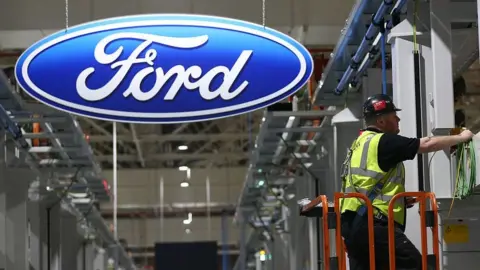Ford boss warns on 'disastrous' no-deal Brexit
Ford's European boss has said a no-deal Brexit "would be pretty disastrous" for British industry and could affect the company's future in the UK.
Steven Armstrong said he was "still confident" a tariff-free frictionless trade deal would be done.
But he told the BBC that a no-deal outcome would "force us to think about what our future investment strategy for the UK would be".
Mr Armstrong said a deal based on the EU-Canada deal would not work for Ford.
Although a similar UK-Canada arrangement "would allow tariff-free trade, it would still involve border checks - and would upset the just-in-time delivery model used by the company in Europe", he said.
In the UK, Ford makes engines at its plants in Dagenham and Bridgend. It also has a joint venture making gearboxes in Halewood on Merseyside.
His comments come as Prime Minister Theresa May prepares for a crucial Brexit summit on Wednesday amid fears that talks have hit a "real problem" over the Northern Ireland border.
Extra costs
Mr Armstrong said he would not like to see a Brexit that meant the UK would default to World Trade Organization rules and tariffs. "That would put a significant amount of cost in our business," he said, adding that any additional costs would make the UK less competitive.
"It would certainly make us think long and hard about our future investment strategy."

Analysis
 Getty Images
Getty ImagesBy Theo Leggett, BBC international business correspondent
Car company bosses really don't like the idea of a no-deal Brexit. Steven Armstrong's warning follows a series of other foreboding statements from leaders whose firms have factories in the UK. They've been increasingly blunt recently, warning of potentially serious short-term disruption - production lines being halted - and a long-term loss of investment.
Mr Armstrong has made it clear he thinks a "Canada-style deal" with the EU will not cut the mustard either. This is a proposal favoured by many opponents of the prime minister's plans - a free trade deal modelled on the one the EU already has with Canada, with some extra benefits added on.
The concern for Ford is that while such a deal might allow products to cross borders without tariffs being applied, it would still involve customs checks. That's not a major problem when you're sending cars and parts across the Atlantic - immediacy isn't necessary.
But within Europe, manufacturers rely on "just-in-time" delivery, with fleets of lorries carrying parts from across the continent exactly when they are needed. Even minor delays at customs would upset this model. The industry wants "frictionless" trade, with no border checks at all.
Yet the compromises needed to guarantee frictionless borders seem to be politically indigestible.

Ford's Bridgend plant is losing its contract to supply engines for Jaguar Land Rover (JLR) in 2020, and the plant is seen as vulnerable.
Mr Armstrong said there was an investment strategy for Bridgend for the near-term future, and that plan would continue.
But beyond that, "it very much depends on what happens post-Brexit", he added.
"If we have a deal that allows us to be competitive in the UK then we will continue with the investment strategy. But it's too early to be specific about Bridgend at this point."
He dismissed suggestions that Brexit could be a convenient excuse to shrink the Bridgend plant after the JLR contract ends: "We have to look at what's happening within our broader business. We have been very clear since [JLR] decided to put their business elsewhere that we would continue to look for options for Bridgend."